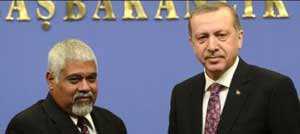| Paramaribo, Mar 8 (Prensa Latina) The vice president of Suriname, Robert Ameerali, and Turkish Prime Minister Recep Tayyip Erdogan, signed two agreements in trade and economy issues, reported the digital website Caribbean News Now.
The bilateral agenda includes talks aimed at strengthening political and economic relations, as well as to address various regional issues and on cooperation in the international arena. In press conference by the two leaders, Erdogan announced that they will soon sign three other deals on visa-exemption, promotion and reciprocal protection of investments and air transport. He stressed the interest of the Turkish government to strengthen ties with Latin America, adding that Surinam support is crucial to boost relations with the Caribbean Community (CARICOM). Meanwhile, Ameerali described this visit “a historic step” to forge closer ties with Turkey. “We welcome the Turkish investors wanting to do business in Suriname, and I can assure that our business delegation is seriously interested in business opportunities here,” he affirmed. On behalf of the President of Suriname, Desi Bouterse, Ameerali invited the Turkish president to visit the Caribbean nation. This is the highest level visit since Suriname and Turkey established diplomatic relations in 1976. sc/abo/ls/lpn |
|
| Modificado el ( viernes, 08 de marzo de 2013 ) |
Category: Business
-

Suriname, Turkey Sign Economic Cooperation Agreements
-

Turkey to Become Europe’s Strongest Economy by 2050
Baku-APA. Turkey will emerge as the strongest economy in Europe by 2050, Turkish President Abdullah Gul said on Saturday, APA reports quoting RIA Novosti.
Turkey is similar to Sweden, while many economic indicators, such as growth, unemployment and budget deficit are better than in the EU, Gul said in an interview with Swedish daily Dagens Nyheter, two day before his official visit to Stockholm.
Gül will visit Sweden at the invitation of King Carl XVI Gustaf in the first ever state visit by a Turkish head of state to the country.
According to Anatolia News Agency, Gul will attend the opening ceremony of the Stockholm University Institute for Turkish Studies. During his two-day visit, he will address the Swedish parliament.
Gül will be accompanied by a delegation of more than 100 businessmen.
via APA – Turkey to Become Europe’s Strongest Economy by 2050 – President.
-

Turkish Airlines promotes its ‘Winter In Turkey’ campaign
Turkish Airlines is promoting its ‘Winter In Turkey’ campaign, offering tourists competitive prices and promotions to one of the world’s fastest growing tourist destinations.
Building on its credentials as the world’s fastest growing airline, Turkish Airlines has a growing network across the Middle East, which now provides access to over 200 destinations worldwide. The heightened popularity of Turkey as an all-round holiday destination is further complemented by the award winning service and competitively priced flights of Turkish Airlines, whether for a holiday trip or stop-over in Istanbul for beyond destination travel.
The number of tourists travelling to Turkey from the GCC region have increased dramatically in the last few years, with a growth of over 370% from the UAE and almost 600% from Qatar comparing August 2011 to August 2012 figures, all contributing to over 31 million foreign tourists to the country in 2012.
Turkish Airlines President and CEO, Temel Kotil, Ph.D said: “As the national carrier of Turkey, we are delighted with the growing popularity of Turkey as a preferred tourism destination for visitors from around the world, including the GCC region. Turkey’s spectacular cultural blend of Eastern and Western influences and cultural linkages with the Middle East make the country a popular destination amongst GCC tourists.
“With Istanbul less than five hours away from the Gulf Region, and the country offering access to winter sports for almost half the year, we are confident passenger number will increase with the launch of our new ‘Winter in Turkey’ campaign.”
The ‘Turkey in Winter’ campaign, running until March, highlights the country’s seasonal offering, as a playground for exhilarating sports with over 20 skiing destinations, as well as the enriching cultural experiences in Istanbul and historical cities, delectable culinary delights and stunning natural scenery.
The ski slopes in the country are set to international standards and host competitions including the upcoming World Youth Snow-Board championships from March 1-11 in Erzurum. For those seeking relaxation, there is an abundance of thermal spas in world-famed areas like Pamukkale and Sandikli.
In 2013, the number of beds in ski resorts is set to grow by 60,000 to accommodate for the soaring popularity of winter tourism in the country. In resorts like Erciyes, where occupancy rates have approached 100%, construction of 21 hotels is due to begin this year. According to the Kayseri Tourism Master Plan, the 275 million Euro investment is expected to provide 5,000 additional hotel rooms, setting Erciyes as one of the best mountain and winter sports resorts in the Middle East and Balkans.
Bursa, a key winter destination nestled in the northwest of Turkey and the erstwhile capital of the Ottoman Empire, is famed for Mount Uludag and an expansive ski resort which combines traditional elements of chic alpine chalets and log fires, with fine dining, five star hospitality and relaxing spa facilities.
Sahabettin Harput, Governor of Bursa, said: “Bursa is regarded as a pioneer of winter tourism in Turkey because of its traditional approach to Alpine hospitality. The city’s rich historical relevance pays homage to the opulence of the Ottoman Empire and provides tourists with the ultimate winter holiday destination.”
-

Azerbaijan, Turkey expand relations in migration sphere
Azerbaijan and Turkey have explored ways of developing cooperation in migration sphere.
 Azerbaijan and Turkey have explored ways of developing cooperation in migration sphere, as chief of the State Migration Service (SMS), 3rd rank migration service counsellor Firudin Nabiyev has met Counsellor for labor and social protection at the Turkish Embassy Namik Ata and representatives of Azerbaijan International Society of Turkish Industrialists and Businessmen (TÜSİAB) and Azerbaijani-Turkish Business Association (ATIB).
Azerbaijan and Turkey have explored ways of developing cooperation in migration sphere, as chief of the State Migration Service (SMS), 3rd rank migration service counsellor Firudin Nabiyev has met Counsellor for labor and social protection at the Turkish Embassy Namik Ata and representatives of Azerbaijan International Society of Turkish Industrialists and Businessmen (TÜSİAB) and Azerbaijani-Turkish Business Association (ATIB).Nabiev informed about the country`s achievements founded by national leader Heydar Aliyev and being effectively continued by President Ilham Aliyev, AzerTAj reports.
He also stressed the importance of strengthening state control over migration processes, as well as the foreign companies acting in comply with the country`s Law.
Namik Ata, in turn praised all sphere developing relations between the two countries and expressed confidence that these ties would further develop.
News.Az
via News.Az – Azerbaijan, Turkey expand relations in migration sphere.
-

Turkey to invest in Afghan energy
Mr Taner Yildiz Turkish Minister for Energy and Natural Resources as saying that Afghanistan had great resources for production of electricity and announced plans to invest in Afghan energy industry.
TPAO, a Turkish petroleum corporation, won the tender for oil extraction at the Mazar i Sharif Province of Afghanistan and will invest about USD 100 million. Turkish companies won the tender for gold mining in Afghanistan.
Source – Vestnikkavkaza.net
via Turkey to invest in Afghan energy – 304759 – 2013-03-09.
-

Turkey’s shale gas chance
Following Energy Minister Taner Yıldız’s recent announcement that indications of possible shale gas resources had been found in the Central Anatolian provinces of Ankara, Konya and Kırşehir, we started to frequently talk about a “shale revolution.”
A shale revolution, which would change the entire energy equation of the world, according to the International Energy Agency’s Chief Economist Fatih Birol, has finally turned up. When I scanned my personal archives, I found a former article of mine written in April 2012 on that subject.
In that article, I gave some figures that were mentioned in a meeting held in Istanbul with the cooperation of Sabancı University and MIT Energy Enterprise. During the meeting, MIT professor Melanie Kenderdine said that Turkey’s shale gas potential was estimated to be around 420 billion cubic meters, which corresponds to the 10-year energy needs of Turkey.
The figure suggested by the Turkish Association of Petroleum Geologists (TPJD) President İsmail Bahtiyar; however, was even above Kenderdine’s estimations. According to Bahtiyar, Turkey has 13 trillion cubic meters in shale gas reserves, which could meet the country’s energy need for 40 years.
When these contradictory numbers are considered, it becomes clear that Turkey is first required to determine its true shale gas potential in an accurate way.
Consequently, it is a crucial step for Taner Yıldız to announce that the work with regard to shale gas has started and international energy companies who want to conduct research on this subject have been invited to Turkey.
So, in which part of Turkey is this shale gas located?
Professor Kenderdine put special emphasis on the Black Sea region, while presenting some photos taken by NASA during the meeting. According to experts, a zone of shale gas that extends from the Baltic shores to Poland, Ukraine, Romania and Bulgaria, could also extend to the Black Sea.
It is known that Canada-based TransAtlantic Petroleum Ltd. is conducting research in Thrace, while Shell is conducting search operations in the southeastern part of Turkey, especially around Diyarbakır.
Meanwhile, Exxon Mobil Corporation is also showing an interest toward the southeastern part of Turkey. Along with Konya, Kırşehir, and Ankara, the regions announced by Yıldız, the eastern province of Erzurum was also suggested among the cities with rich shale gas potential.
It is certain that Turkey, which spends an annual 60 billion dollars on energy imports, has a great opportunity ahead due to shale gas.
February/26/2013
via GİLA BENMAYOR – Turkey’s shale gas chance.
